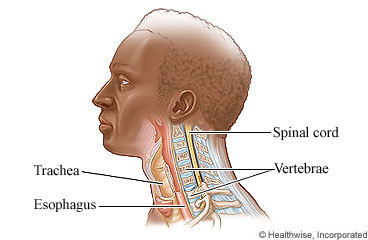Broken Neck: Care Instructions
Overview

A broken neck can range from a small, hairline crack, to a bone or bones breaking into two or more pieces.
Treatment for a broken neck depends on how bad the break is and which bones are involved. You may be sent home
with a neck brace or collar. You can help your neck heal with care at home.
Healthy habits can help you heal. Eat a variety of healthy foods, and don't smoke.
Follow-up care is a key part of your treatment and safety. Be sure to make and go to all
appointments, and call your doctor if you are having problems. It's also a good idea to know your test results
and keep a list of the medicines you take.
How can you care for yourself at home?
-
If you were fitted for a neck brace, wear it exactly as directed by your doctor. Do not take it off until
your doctor tells you to.
-
Be safe with medicines. Read and follow all instructions on the label.
-
If you are not taking a prescription pain medicine, ask your doctor if you can take an
over-the-counter medicine.
-
If the doctor gave you a prescription medicine for pain, take it as prescribed.
-
Store your prescription pain medicines where no one else can get to them. When you are done using
them, dispose of them quickly and safely. Your local pharmacy or hospital may have a drop-off site.
-
Follow your doctor's directions for returning to your normal activities.
-
Do any exercises that you are given to keep your muscles strong and reduce stiffness.
-
Put ice or a cold pack on the painful area for 10 to 20 minutes at a time. Try to do this every 1 to 2
hours for the next 3 days (when you are awake). Put a thin cloth between the ice and your skin or brace.
-
Make sure that paths in your home are clear so that you do not fall. Also make sure that lighting is good
and that carpets are tacked down to prevent tripping.
-
Do not drive unless your doctor says that it is okay. If you are allowed to drive, always wear a seat
belt.
-
Talk to your doctor about medicines or changes in your diet that can help make your bones stronger.
When should you call for help?
 Call 911
anytime you think you may need emergency care. For example, call if:
Call 911
anytime you think you may need emergency care. For example, call if:
Call your doctor now or seek immediate medical care if:
Watch closely for changes in your health, and be sure to contact your doctor if:
Current as of: July 17, 2023
Content Version: 14.0
Care instructions adapted under license by your
healthcare professional. If you have questions about a medical condition or this instruction, always ask
your healthcare professional. Healthwise, Incorporated disclaims any warranty or liability for your use of
this information.